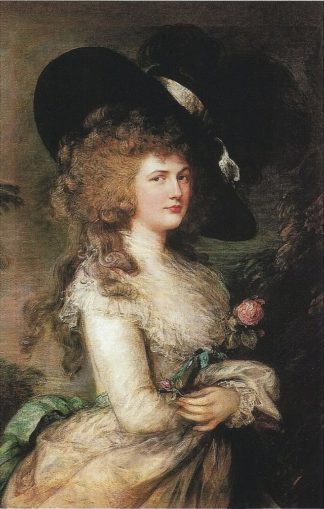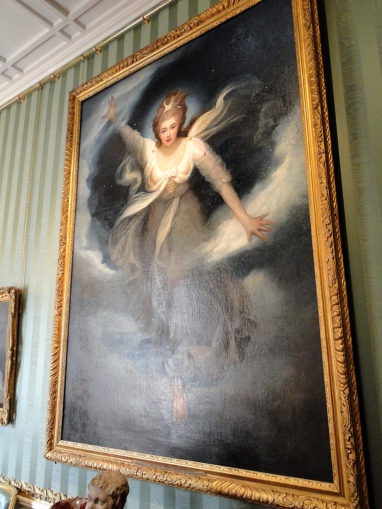
Thomas Gainsborough, Public domain, via Wikimedia Commons
Amanda Foreman is the British/American daughter of American film-maker Carl Foreman (Bridge on the River Kwai, High Noon). Carl Foreman moved to England from Hollywood during the McCarthy era; he had been blacklisted and his passport removed because of his suspected Communist sympathies. Amanda, having been educated at a series of private schools, got undistinguished A levels. She stuck with her C in History but went on to retake her bottom grade E in English at a crammer (expensive private tutoring college) and … still got an E. I mention this not just to be snobby, but because I think it has a bearing on this book. It says to me that here is somebody from a famous, very left-wing background, with a lot of money, who so desperately wants to be good at a particular thing that they simply will not accept their own lack of natural flair at it. As Dirty Harry said, ‘A man’s gotta know his limitations’. It reminds me a bit of Martin Amis (who didn’t come from a left-wing background, but also went to an expensive crammer when he failed to get the grades he felt his genius deserved). Foreman later went on to do a D.Phil at Oxford, switching from a study of eighteenth-century Whig politics to studying Georgiana, Duchess of Devonshire after ‘falling in love’ with her. This book, the result of her research adapted for the mass market, came out in 1998 and was an instant success. It was subsequently filmed, with Keira Knightley and Ralph Fiennes in the starring roles.
I don’t propose to give anything other than the briefest outline of Georgiana’s life here, because It’s already so well-known. Born Georgiana Spencer, she was a famous beauty, was married as a teenager to the Duke (who was a bit of a cold fish) and subsequently became a leading political fixer, Whig hostess and fashion icon. Unfortunately, apart from a few years, she couldn’t stay away from the gaming tables and lost the modern equivalent of many millions over and over again. She was also the great-great-great aunt of the late Lady Diana Spencer. At the time of the book’s original release, much was made of the connection: that the two beautiful, lively young Spencer girls had each married, for dynastic reasons, a slightly dull older aristo who didn’t really appreciate them and already had a mistress, and they both subsequently became fashion icons beloved by society.
Back in 1998, I used a birthday book token to buy the tome fresh and new (and expensive), in hardback. It started promisingly but, after a few chapters, I gave up (as did a history-mad friend who was reading it at the same time) and to the charity shop it went. Puzzled by the high praise it enjoyed, have always thought I should give it another go. This proved a good time to do it, as there are loads of paperback versions now available at a very good price which are easier on the arms than the weighty original. The one I got, for about £3.75 iirc, is an American trade paperback version by Random House with a pastel-coloured Reynolds portrait of Georgiana on the front, thick cream paper and deckled edges – a very attractive object in itself and with good type size, which isn’t always the case with paperback editions.
At the previous attempt, someone asked me why I had given up on it. ‘Well’, I replied, ‘it’s a bit ‘Georgiana was feeling rather low that August. ‘I am feeling rather low’ she wrote in her journal’ (not the actual text). Having read the whole thing this time, I stand by that. The book takes the form of narrative history (or, as Henry Ford famously remarked, ‘One damn thing after another’). We learn that on November the such and such, the party went to Buxton, or wherever. The duchess herself only springs off the page (and, boy, does she) when her own words are quoted.
Here’s where my opening sentences, I think, are relevant. The research is very thorough, as evidenced by the footnotes, the many pages of end-notes and the exhaustive bibliography. Foreman has clearly put in a lot of work, which should go without saying as an Oxford D.Phil. But, as was emphasised to bright school pupils in ye olde days who wished to carry on into higher education with the subject, with history ‘knowing the facts will only get you so far’. To do better, to really make your mark, you have to manipulate those facts into an argument and apply a good level of analysis. You need to present your argument in a fresh and original way, using your facts to back it up rather than just heaping them on top of each other. You have to make the world anew. It may seem odd to apply A level insights to a postgraduate, but, there again, it may say something important about the differences in approach between then and now. We do sort of get there eventually, as an afterthought, in the epilogue, where the argument seems to run that Georgiana has been ignored by serious historians to date because male historians concentrated on important political and royal figures, to whom she was just an adjunct, and feminist historians have concentrated on what was seen as ‘the women’s sphere’, whereas Georgiana bestrode both. This is more a historiographical point. But up until that afterthought, as I said, the book is more of a chronological treatment, surrounded by an awful lot of Whig politics (as one might expect from an author who began her PhD on that topic). The writing itself (here’s where my initial comment about English comes in) has a curiously flat quality. There is nothing actually wrong with it, but nothing especially right with it either. Not much variation of rhythm, or light and shade. It becomes, in parts, dear reader, a bit of a slog.
What is missing, in my view, is what the best historians have – that vital spark, that liveliness, that ‘listen to this – this is really important’ feeling which drives the narrative forward. Georgiana, in life, clearly had that; the book, as far as I am concerned, does not. I have just opened the book, and picked one sentence at random. It deals, as chance would have it, with a crisis point in their ménage à trois (the duke and duchess were living with Lady Elizabeth Foster, later to become the duke’s second wife): ‘Georgiana’s talk of retiring from London convinced Bess that the Duke could no longer be kept ignorant of the true state of affairs’ (p234). Leaden. Who are we supposed to be focusing on, in that sentence? It’s Georgiana. Oh, hang on, it’s Bess. No wait, it’s the Duke.
Contrast this with sentences taken at random from another book about the same era, David Cecil’s biography of Lord Melbourne: ‘Strikingly handsome, with their tall, well-made figures, firmly-cut countenances and dark eyes brilliant with animation, the Lambs were alike vital, sensual, clever, positive and unidealistic. People did not always take to them’. Note the verve, the rhythms, the contextualising, the vocabulary: the striking immediacy of the image and information conveyed.

Now, you might think I am saying I didn’t enjoy this book at all. Not so. As I said, the research is exhaustive, and – here’s the thing – you can’t really go wrong with a book on the eighteenth century, in my opinion anyway: the Regency crisis, the feckless but staggeringly powerful aristocrats, the fashions, the French Revolution, the rise of Napoleon, the glittering society occasions, the stately homes, the jewels, the many affairs and liaisons and gossip and literary triumphs. The wit. The style. These are the stars of the book, presented however in a rather static and – dare I say it – plodding fashion.
There is not really much character development, or indeed character insight: Georgiana is a beauty, a fashion icon, a grand hostess, bad with money. Then she is all those things again. And again. She does try to reform at the end of her life (she died aged just 48) after a serious illness forced something of a retirement from society, but the vast majority of the book has little story arc apart from repetition of the debt, the fashionable gatherings, the politics. I was hoping to learn more about her interests in mineralogy (she founded Chatsworth’s collection of museum-quality pieces, and, I think I’m right in saying, was a very early promoter of Blue John, or Derbyshire fluorspar) and chemistry, but these are only mentioned a couple of times in passing. Maybe there isn’t much more to learn.
Georgiana herself was a mass of contradictions, sounding very modern in some of her writings (‘I hate myself’, she wrote at one point). She loved her children, cheated small tradesmen, was sent abroad by her husband because of having an affair with Charles Grey (later Earl Grey, of tea fame) which resulted in an illegitimate daughter, continuously let her mother down when Lady Spencer begged her to stop gambling and getting into debt for such large amounts which she then persistently hid from her husband, yet piously wrote to her son, later in life, that she had always tried to do her best to follow the paths laid down by the Almighty.
Like the author’s verdict on her subject in the epilogue, maybe this book falls between two stools. It’s a bit too dry to be thrilling, and a bit too commercial to be academic. Maybe the enormous hype which accompanied its release raised expectations so high that it made disappointment more likely. Still, it sold millions of copies, so what do I know?
A qualified ‘recommend’.
© foxoles 2020
The Goodnight Vienna Audio file

